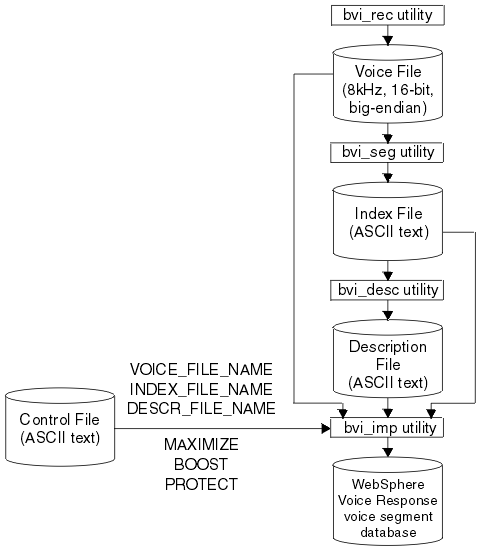Purpose
Import voice segments from the voice file, and information from the description file, into the Blueworx Voice Response voice segment database.
Description
bvi_imp is the final step in the batch voice import process. It takes each segment in turn and puts it into the voice segment database, compressing and filtering if necessary.

Control parameters
The bvi_imp utility uses the following control parameters from the bvi.control file:
- VOICE_FILE_NAME (supplied value: bvi.voice)
- Specifies the name of the voice file created by bvi_rec and used by
the other utilities. You can specify any valid voice file. If you do not specify
a path, the utility expects the file to be in the directory $CUR_DIR/ca/BVI_dir.
The file format is 8 kHz, 16-bit linear, big-endian (that is, the most significant byte for each sample is written before the least significant byte).
- INDEX_FILE_NAME (supplied value: bvi.index)
- Specifies the name of the index file. You can specify any valid index
file. If you do not specify a path, the utility uses the index file in the
BVI custom server directory ($CUR_DIR/ca/BVI_dir).
Each line in the index file refers to one voice segment and contains two ASCII-format numbers, the start and end of the located segment. The numbers are byte offsets from the start of the voice file.
- DESCR_FILE_NAME (supplied value: bvi.descr)
- Specifies the name of the voice description file created by bvi_desc.
You can specify any valid description file. If you do not specify a path,
the utility uses the description file in the BVI custom server directory ($CUR_DIR/ca/BVI_dir).
See bvi_desc: Batch Voice description utility for details of the file contents.
- MAXIMIZE (supplied value: 1)
- Specifies whether the voice data is to be amplified such that each segment
uses the full range available. This can improve compressed voice quality significantly.
Possible values for the maximize option are 0 (disabled) and 1 (enabled).
MAXIMIZE is forced to enabled if the BOOST option is enabled.
- BOOST (supplied value: 6)
- Specifies whether to boost signal frequency components in the range
1500 Hz to 4000 Hz and to cut signal frequency components in the range 0 to
1500 Hz. This can restore signal brightness which is lost when a wide bandwidth
signal is sampled at 8 kHz (the standard sampling rate for digital telephony).
Possible values are:
- 0
- Boost not enabled.
- A positive integer
- Specifies the number of dB by which voice data is to be boosted.
- PROTECT (supplied value: 1)
- Specifies whether existing voice segments are to be protected from accidental
overwrite. If set to 1 (enabled), bvi_imp tests to see if a segment of
the same language, voice directory, and segment number already exists before
writing a new segment to the Blueworx Voice Response voice segment database. If one does already
exist and the PROTECT parameter is set to 1, the utility prompts you to confirm
that you want the existing segment to be overwritten.
Possible values for the protect option are 0 (disabled) and 1 (enabled).
After opening the BVI Custom Server Import window as described in Starting the BVI custom server:
Start importing by typing bvi_imp on the command line and pressing Enter.
bvi_imp can take some time to do the processing necessary to filter and import the voice segments. Progress messages are displayed as each segment is processed.
You can now create prompts that use the voice segments you have imported.